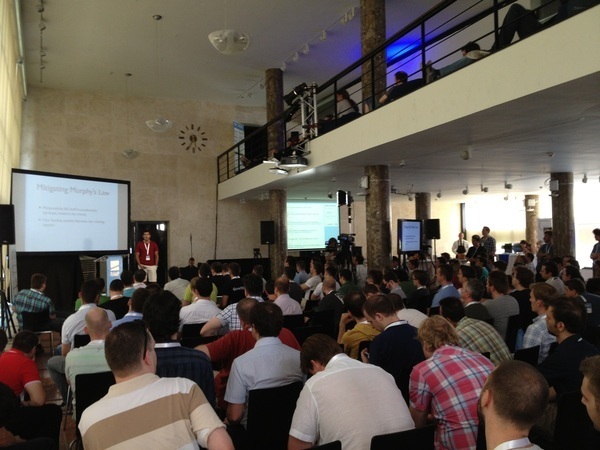How Long Will Programmers Be So Well-Paid? | TechCrunch
Ottway Ducard stashed this in Code
Stashed in: Software!, Education!, Awesome, Learn to program.
Half of all university intro to programming class students don't make it: http://www.codinghorror.com/blog/2006/07/separating-programming-sheep-from-non-programming-goats.html
Basically, folks aren't good at algebra: http://pandawhale.com/convo/7380/why-dont-we-make-learning-a-computer-language-a-requirement-in-high-school-linkedin?comment=25805
More kids with an immigrant hunger, perhaps...and access to the best teachers and resources.
There seems to always have been a shortage of scientists in America.
And yeah, many Americans can't even get through algebra.
Students KNOW there's a shortage of programmers too but still very few people learn to program.
The best teachers and resources won't help motivation problems.
Which, I think, means focusing on families and new ways to teach math and science and reading/writing + civics.
Think Bill Nye, Levar Burton but for the 21st century.
Media and entertainment that helps kids aspire to learn science and math from a young age.
Many don't like math because they don't know what they can do with it, show them the future. Inspire them. Teach them.
“If you want to build a ship, don’t drum up the men to gather wood, divide the work, and give orders. Instead, teach them to yearn for the vast and endless sea.”St. Exupery
I am teaching civics this year. The other day, I snuck in calc concepts. Question was about the economy, ROI/leverage, etc... I said, "Bear with me. You'll get this in a minute." Enter graphs, charts, points of intersections, and case studies about "what happens if the line isn't straight." We talked about rates of change, science concepts and geopolitical stuff that applied to that graph and why "math doesn't suck if you use it." I don't even love math (sorry, Adam). But, I can teach Algebra to lower level students who missed their multiplication tables by doing it in chunks and stories--basically double-ending it and inserting into things they love.
True story: "Miss, one thing I don't get about algebra is--what's the point of x." Hmmm.... Apparently, son, you don't get "algebra." Let me explain...
"Catch. Here are two boxes. In this box, I'm going to put these two shoes. Two more shoes in this box. Whatdaya got?"
"Um, four shoes?" he said.
"Brilliant--write that on the board. Answer: 4 shoes.
"Now, here's a box with four shoes but this box--I'm not going to tell you what's inside. It's a secret. Now what have you got?"
"Um, four shoes and I don't know."
"EXCELLENT. You're right. Write that on the board... Answer: 4 shoes + whatever's in the box. Here's the secret: That box is "X." An unknown, a surprise, a Christmas present. Welcome to Algebra. It's all about the unknown.
I make it a point--even teaching history, to connect X to college concepts and kids' personal interests.
I can't code. But I can tell you if you want coders, then maybe someone out there can help me to change curricula and ed policy to give me back the freedom and time to do these things, because right now, it's pushing so far toward testing, stats, and other uniform measures, these victories are tougher to achieve:)
Then, I'll give you all the coders you need:)
I think teaching programming starting in 3rd grade when kids learn their multiplication tables, and keep it as a requirement till the end of high school like taking a foreign language is, then we'll have a lot more competence in programming!
I've seen high schools toss around the idea of including programing as a foreign language requirement. But you're right, no reason it can't be started early, like schools introduce Spanish or Mandarin.
Dawn is teaching the kids to yearn for the sea; love it!
Ironically enough, it's folks who *think* they like math ( more statistics, more data, more testing) who are pushing our schools towards a data-centric mindset. It's as if the Venture Capitalists are taking over the schools -- "show us traction, show us graphs that go up and to the right, quantify all of the data to prove to us your progress."
But clearly, math literacy is a higher priority, no?
We need more design centered work, not data driven work. When was the last time a data driven company made a product you LUSTED after?
Thanks for the vote of confidence... and you are right about the data crunching. I own a business, and I also worked in Corporate America. I respect the almighty bar graph, I really do. But in this case, the cart is going before the horse. Ed reform, brought to you by either Joe McCarthy or Joe Stalin. Not sure which:)
Long term unintended consequences:
1. Those with other options are leaving the field, or choosing not to enter.
2. Seasoned people are hesitant to take on teaching candidates for fear of ruining "their numbers."
3. I, personally, spend more time on data than planning lessons. Lucky for me, I know my stuff. But new teachers? I am concerned for them.
4. People who get the system understand that "If I have to prove X # to prove I'm good, well then I will prove it."
5. High stakes testing causes fear, not proper use of data and analysis thereof with the intention of fostering growth. For example--in my business, if we look at, say, retention, conversions, or customer satisfaction, the goal is to move the line "up and to the right." And to figure out how to better do that... In schools, if that line doesn't go in that direction, people get fired, you have to retrain the next "crop" and the cycle continues. No room for growth or entrepreneurial thinking/chance taking. Sort of sounds like a "five year plan" to me, and um, hate to say that it didn't work for Lenin, Stalin, or Mao either...
Consequences: Grade inflation, poorer instructor quality over time, and dilution of material/watered down stats.
Well, this has gone off course. I'm now studying history (gasp) when I should be talking about why all of you pay your coders so well.
@Ottway--it is the flavor of the month. Last decade, post 9-11, it was civics and citizenship. @Ajay--um, wait a minute, it's coming... um, never. Balance is the key, though. Design without the ability to execute and analyze need for improvement would be labeled ADHD:)
I think people need to be well-rounded. Be able to have a cup of coffee with the other team, gather info, communicate, and then use their expertise to generate something big. The system is becoming too pigeonholed and judgmental about what is good for all of society. Can't be that way systemically.
So how do we help improve the current system?
It seems that there are too many focuses. Here are some ideas:
1. Simplify and streamline testing: one standardized test (preferably the PSATs) in 9th grade, another in 12th grade (SATs); possibly add basic Science to the SATs.
2. Analyze data patterns as a whole -- by school district, by city, by county, and by state, rather by individual school or teacher.
3. Increase focus on both poor districts as well as students within wealthy districts who come from poor backgrounds. In any data-driven system, those are the first students who will get kicked out/ostracized by those fearing repercussion from testing numbers, because of the obvious fact that poor kids test much worse than rich kids.
4. Teacher unions focus on professional development, and for pushing out the worst teachers, instead of protecting them; essentially police themselves, rather than administrators or policy makers making decisions on teachers' effectiveness. According to many teachers I know, they *all* know who the bad teachers are, but the union protects those teachers instead of a) helping those teachers improve in their critical deficiencies b) pushing them out. I literally know teachers whose kids attend the school where they teach, who will go to the guidance counselor and not permit their child to take classes with said teachers. Perhaps this is non-obvious or could lead to increased political tension amidst teachers, but peer evaluations seems to be an effective organizational possibility.
5. Gradually add 5 days to every state's school year for the next 10 years, until each state is at about 230 days of school/year.
6. Invest more money in mentoring programs like big brothers/big sisters; provide after-school support for single-parent/fatherless homes, and/or whichever group statistically is the lowest performing.
I agree on all accounts. I can save my state millions in the new 101 pg teacher eval guide that's generating so much data all of SV couldn't process it. Ask...my...customers. They'll tell you. There's a secret FB pg I'm not supposed to know about, I give surveys, college-style, and I interact w them. They're honest about their feedback--they've given me great ideas and suggestions and my classes are all the better for it.
This is going to be such a key subject as the system gets more and more standardized, pushing out good people and failing kids who aren't at the bar that the system designates. One of my fantastic seniors who seems uninspired solved a Rubics cube while I turned to find a pen. Then he proceeded to outline math/logic sets I couldn't process or replicate. I can't stamp that into a high stakes test--actually, I might mail him to the Valley with a sign that says "hire me." The system doesn't help these kids.
Who will be our champion? I'm not sure. Not sure how to solve it--the system is too big and is designed to self-replicate and protect fiefdoms. For me, I'll control my universe by truly knowing that kid in front of me--by knowing his potential and helping deliver him to that success by any means necessary. Aside from that, whether I survive ed reform is inconsequential:)
I'll do my best send out more math/science scholars, even at the expense of my beloved history.
Long live history! This is amazing; we all appreciate the work you do! Perhaps that is how change will come, women and men like you doing their part to help "the kid in front of me" by knowing their potential and helping deliver them to success by any means necessary.
Thank you, thank you, thank you. :)
Thank you as well. I have really enjoyed this conversation, even though I hijacked it a bit.
Your gratitude gives me energy at a time where this profession is viewed at a historic low. I left corporate America and the business I started w/ my husband to teach. II saw teaching as something I could do to change the world--a vision. The reality has been shocking to me, but insomuch as everyone's reality is shocking to them when it becomes--a reality (case in point, working for the government, large corporations, or even the upcoming SV startup reality show).
There are detractors, saboteurs, and malevolent forces in every field. Sure--the industry has clearly shown me with "ed reform" and the new teacher evaluation system that I'm replaceable on the drop of a dime. But I believe the calling of this profession is higher than that. I'll endure the comments when people say, "Oh, you're a teacher. Good luck with that." Seems a small enough price to me:)











11:19 AM Oct 27 2012